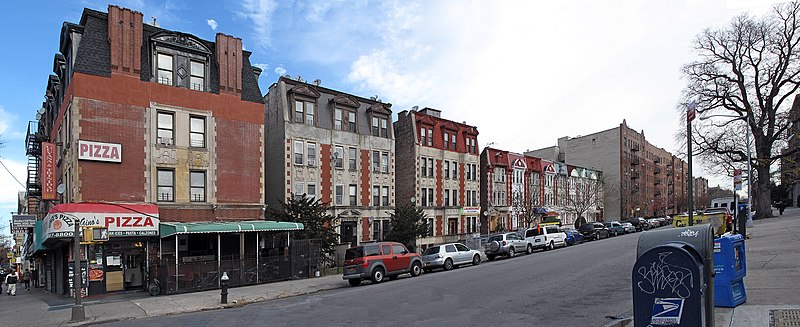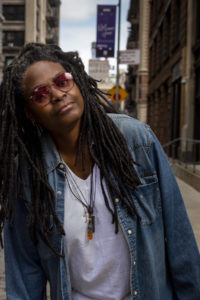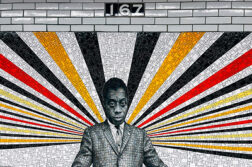
I GREW UP in one of the worst neighborhoods in New York City. East New York, Brooklyn, didn’t really give you a lot of opportunities to explore your sexuality. The East conditioned you to explore methods to stay safe, to stay alive.
Across Linden Boulevard were the worst projects in NYC, the Louis Pink Houses, and across the street was Howard Beach, Queens. Howard Beach was primarily an Italian-American neighborhood. John Gotti lived in Howard Beach. Those who lived there made sure to communicate the message that blacks were not allowed.
On December 20, 1986, a young black man from Crown Heights named Michael Griffith, was riding his bike in Howard Beach. He was murdered during an attack by a white mob as they chased him out of the neighborhood. Just like Willie Turks and Yusef Hawkins, Griffith was killed by the rampant racism that many people do not realize existed in New York City.
While walking home from a friend’s house around that time, a blue Cadillac filled with white boys pulled up next to me and the guy sitting on the passenger side said, “Get out the neighborhood, nigga.” I thought for sure I was going to get pulled into the car. Instead, they laughed and drove away.
I was mugged at nine years old and the clarinet loaned to me by the school for practice was stolen. The much older black kid that took it also punched me in my face: a parting gift. He was found dead a few weeks later.
Me and my homegirls watched where our friend Kathy’s brother lay dead for hours. He was shot under my window, and the killers left his body for the neighborhood to discover.
It was normal to hear random gunshots popping off at night. The walk from the Grant Avenue train station to the building was like walking through a mine field. You knew you were safe when you saw the drug dealers at their stations.
Being black in America is a job; being gay is a luxury. Being gay could be turned off or hidden, but being black was like being a police officer: it always made me a target. Everybody in my neighborhood knew I was gay. But no one ever thought to comment about it. We were all too busy being black.
I came of age in the West Village. My academic, cultural, and sexual growth was enormous. I attended NYU and met different people and had many interesting experiences. But most importantly “the Vill” taught me that I was kind of not alone. It was a place where I could experience other people like me. I say “kind of,” because I have been ostracized by my LGBT siblings for being black.
I was in Chelsea one day. Two friends and I were shopping along 8th Avenue when we walked into a nice-looking clothing store. Now two of the three of us were earning six-figure salaries. We were well-dressed and not looking like—whatever a thief looks like. That didn’t stop the white shop boy from following us around the store. I really couldn’t believe this was happening. When we confronted him with his racist tactics, my law degree served its purpose. After my verbal onslaught he finally blurted out that because we were black, we presented the possibility of theft.
That experience and a few others had me confused. The LGBT community was constantly advocating for equal treatment, equal rights—the same rights black people and other oppressed communities were struggling to obtain. I thought since we shared a common goal, we moved as a collective to obtain equal rights for all. I was wrong.
I never had to “come out.” I’ve seen and heard so many stories about how people had to struggle to be themselves. Gay people struggling to be accepted. Why must anyone seek the acceptance of others about who and what they are—how God made them? I was very clear about who I was from a very early age. I didn’t struggle with it; I was proud of me. Most importantly I never cared what other people thought of me. I still don’t allow myself to be judged or defined. Before I am anything else, I am black in America. There are some of my gay “family” members who will not miss an opportunity to remind me of my blackness in the most derogatory way. Without reservation, gay people will treat me with the same violence they fight against. They fight for white gay acceptance, not black.
My parents and ancestors taught me many things. They taught me how to fight. My great-great-grandmother was a freed slave. My grandmother, a member of the Great Migration, worked as a cleaning lady at night. I have used every modality of violence and intellect to get here, to pay homage to my ancestors.
Today I am an assistant professor at LaGuardia Community College. I teach my students the importance of education. I talk to them about not allowing people to take away their power. I convince them to acknowledge they are not “minorities,” and they come from cultured civilizations. I try to get them to accept that they can make a difference in this world where their membership in a protected class creates the illusion of disempowerment.
My students have shown me that today being “gay” is fluid. As I experienced many years ago, my students don’t spend so much energy defining their sexuality. Many of my students don’t feel compelled to justify their sexual orientation. I love it. They love who they want to love. They don’t make excuses for what they are not. They see that hate and ignorance is endemic in this country, no matter who you love.

Pastor Charlene L Bryant, J.D. is an assistant professor of criminal justice at LaGuardia Community College and a participant of the Rainbow LaGuardia exhibition.






Discussion3 Comments
If this was a book, I’d buy it in a heart beat. I am so very proud of you my best friend and sister. Great read!!
Awesome,hopefully your students will gain some insight as to your story,watching you and my sisters grow up and share your experiences from our neighborhood gives you a voice that screams this so-called village does have a positive impact !!
This is essential reading. Please share it widely. I had the distinct pleasure of doing an oral history with Charlene at LaGuardia Community College for the Rainbow LaGuardia exhibit. The link to the exhibit is at the end of her essay. Charlene doesn’t mince words. Her journey took her from Red Hook to East New York to Greenwich Village to Georgetown and back to New York, and a few points in between. It ain’t boring. Her personal anecdotes speak volumes about being Black in America, and the intersection of race and sexual orientation. Thank you, my sister, for all that you do on campus and off.